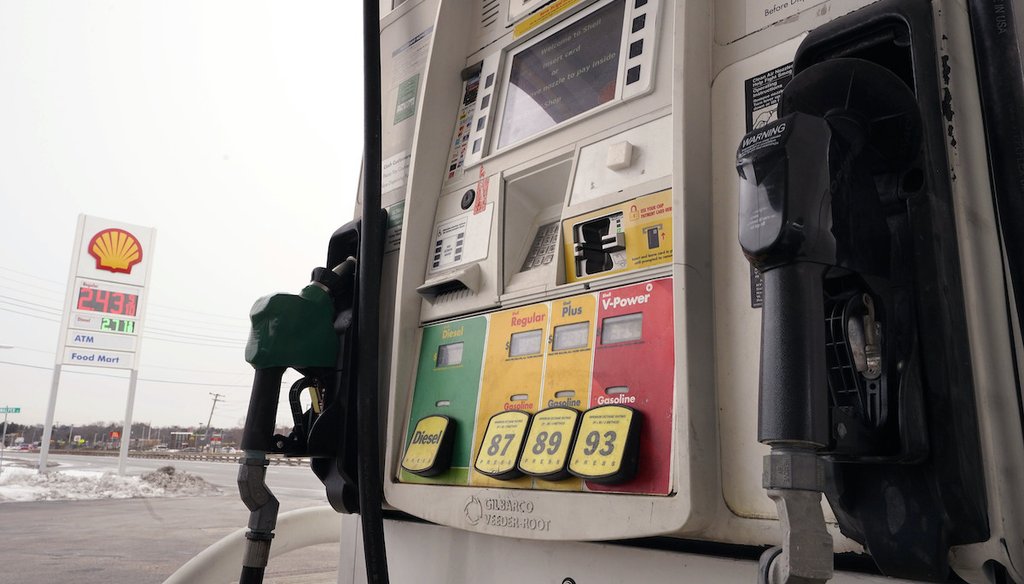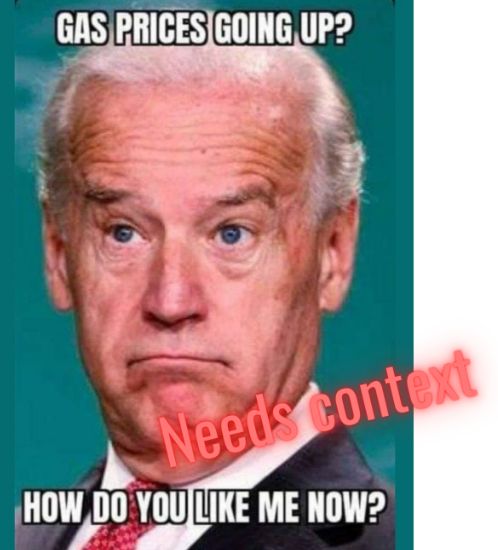Stand up for the facts!
Our only agenda is to publish the truth so you can be an informed participant in democracy.
We need your help.
I would like to contribute

Gasoline and diesel prices at a Shell gas station in Westwood, Mass., on Feb. 18, 2021. (AP)
If Your Time is short
• Gas prices have gone up under President Joe Biden, continuing an upward trend that began in May 2020.
• The increase is largely due to supply and demand, energy experts say, rather than presidential policies.
• The coronavirus pandemic prompted a big fall in oil demand and gasoline prices, due to declines in driving and air travel. As the economy has slowly rebounded, growing demand has boosted prices at the pump.
There’s been chatter online recently about the recent spike in gasoline prices — and whether President Joe Biden is to blame.
One Facebook post features a photograph of Biden with the caption, "Gas prices going up? How do you like me now?"
Another Facebook post uses a different picture of Biden and a thinly veiled comparison with former President Donald Trump. "Gas prices are soaring," the caption says. "But thank God there were no offensive tweets this week."
These posts were flagged as part of Facebook’s efforts to combat false news and misinformation on its News Feed. (Read more about our partnership with Facebook.)
Concern about rising gasoline prices also reached Fox News, where anchor Bill Hemmer said on March 1, "Gas prices are going higher, and if you don't think that Middle America takes notice of that, think again. We are seeing prices now that we frankly haven't seen in years."
Given the apparent alarm about gas prices, we thought it would be a good time to take a look at where they stand now, how they measure up historically and what’s causing the price movements.
Are gas prices going up?
Yes, according to federal data, gas prices have mostly been going up since they bottomed out at $1.87 a gallon in late April 2020. With gas prices reaching $2.72 in late February 2021, that’s an increase of 45% within about 10 months.
Part of that has come on Biden’s watch — prices have risen about 10% since he took office in January 2021. The bulk of the increase came under Trump.
Are gas prices higher than they’ve been "in years"?
No. Today’s prices are the highest they’ve been in about 18 months.
Gas prices were similar to or higher than their current level for much of the time between October 2017 and January 2020 — that is, more than two years of Trump’s presidency. Prices were higher than today for all of the time between March 2018 and November 2018, and all of the time between April 2019 and August 2019.
Gasoline prices have a seasonal component: Demand rises during the summer and falls during the colder months, meaning that summer prices tend to be higher. That pattern is exacerbated by laws requiring more expensive gasoline formulations during the summer in order to limit emissions.
Looking just at winter levels, gasoline prices today are roughly in line with where they were at similar points in the calendar in 2017, 2018, 2019 and 2020, when Trump was in office.
Is the rise in gas prices Joe Biden’s fault?
Some critics of Biden have said that his cancellation of the Keystone XL pipeline early in his presidency would quickly result in higher gasoline prices. But we previously found that, for several reasons, that’s not the case.
For starters, the pipeline wasn’t operating yet. "Revoking it does nothing to today’s balance" of supply and demand, said Mark Finley, a fellow at the Center for Energy Studies at Rice University.
Any price impact from the pipeline decision, or from other Biden policies to limit fossil fuels, would be "years down the road," said Patrick De Haan, head of petroleum analysis at GasBuddy, a website that tracks gas prices.
In addition, most of the oil to be carried by the Keystone XL pipeline would have been exported, meaning U.S. customers should see little direct effect on prices.
Experts said it was conceivable that Biden’s policies could eventually affect gas prices. But any impact wouldn’t be detectable in the recent gas price changes.
So why are gas prices rising?
In general, a president has limited control over the weekly and monthly shifts in gasoline prices. On a short-time horizon, gas prices depend mostly on global supply and demand.
On the supply side, the OPEC oil cartel and Russia have made voluntary production cuts, which has the effect of raising prices, Finley said.
In addition, Finley said, U.S. companies are investing less in finding new sources of oil. This is due to a combination of factors, including low oil prices over the past year, which discourage companies from developing new drilling sites, as well as growing pressure from environmentalists to shift away from fossil fuels.
"Oil companies were hit hard in 2020," De Haan said. "They are not in growth mode. They are in survival mode."
But the biggest factor in the recent price spike has been the slow but steady economic recovery from the coronavirus pandemic.
When the pandemic began in the first quarter of 2020, the price of oil fell off a cliff. That reflected a plunge in demand: The pandemic shut down some major industries for weeks, and sharply curbed the ability of people to travel (in airplanes) and commute to jobs (in cars). Crude oil prices closely track the price at the pump.
What the pandemic took away, however, the recovery has begun to put back.
"The coronavirus numbers in every state are moving in the right direction," De Haan said. "We’re now seeing the highest demand since the pandemic started. And now that demand is up, and oil production is not, that has pushed oil prices up."
It’s hard to say whether Biden deserves credit for the improving coronavirus outlook and economy. But De Haan said you could actually make the opposite argument than the Facebook posts do — that rising gas prices are a positive sign of growing consumer confidence.
"You could argue that the economic outlook has improved under Biden," he said, "providing a dose of optimism among consumers" that has led to rising prices at the pump.
Our Sources
Facebook post, Feb. 26, 2021
Facebook post, Feb. 27, 2021
Bill Hemmer, remarks on Fox News, March 1, 2021
Energy Information Administration, weekly U.S. all grades/all formulations retail gasoline prices, accessed March 2, 2021
Energy Information Administration, Cushing, Okla., West Texas Intermediate spot price, accessed March 2, 2021
PolitiFact, "Keystone XL suspension probably won’t boost oil prices for Americans," Feb. 15, 2021
Email interview with Anna Mikulska, fellow in energy studies at the Center for Energy Studies at Rice University's Baker Institute for Public Policy, March 1, 2021
Interview with Mark Finley, fellow at the Center for Energy Studies at Rice University, March 2, 2021
Interview with Patrick De Haan, head of petroleum analysis at GasBuddy, March 1, 2021

































